21 Dec 2018 | Croatia, Hungary, Macedonia, Media Freedom, media freedom featured, Montenegro, News and features, Poland, Serbia
[vc_row][vc_column][vc_single_image image=”104453″ img_size=”full” add_caption=”yes”][vc_column_text]Additional reporting by Ada Borowicz, Ilcho Cvetanoski, Lazara Marinković and Zoltán Sipos
Unpatriotic behaviour. Sedition. Being in the pay of shadowy external forces. Faking a neo-Nazi event. These are just a few of the charges that have recently been levelled against independent journalists by pro-government media outlets in several central and eastern European countries.
The opening volley in a sustained campaign of vilification directed at Serbia‘s independent media was fired by the state-owned weekly Ilustrovana Politika at the end of October, with an article that accused journalists who are critical of the government of being “traitors and collaborators with the enemies of Serbia”.
Two weeks later, Ilustrovana Politika followed up with another piece that accused the veteran journalist Ljiljana Smajlović – who has long been critical of the nationalistic legacy bequeathed on the country by its former leader Slobodan Milosević and co-founded the Commission Investigating the Murders of Journalists in Serbia – of complicity in the 1999 NATO bombing of Belgrade.
In mid-December, Ilustrovana Politika’s campaign of character assassination against Smajlović ratcheted up another level with a garish front page depicting her as a Madonna figure with two naked infants bearing the features of Veran Matić, the chairman of the commission, and US Ambassador to Serbia Kyle Scott.
Smajlović has no doubt over what lies behind this tidal wave of denigration, of which she has become the prime target.
History repeating itself?
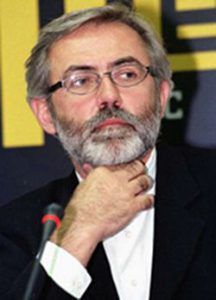
Editor Slavko Ćuruvija was murdered in 1999.
The long-running trial of four ex-members of the Serbian intelligence service accused of the murder of Dnevni Telegraf editor Slavko Ćuruvija – shot dead in April 1999 a few days after the pro-government Politika Ekspres accused him of welcoming the NATO bombardment – is now in its final stages, and Smajlović is convinced that the current campaign against her is designed to influence the judges in the case.
“The attacks come from the same Milosevic-era editors who also targeted my colleague Ćuruvija as a traitor prior to his assassination,” she told Mapping Media Freedom. “What is also sinister is that they are published and printed by the same state-owned media company that targeted Slavko nearly twenty years ago.”
“The clear implication is that I am the same kind of traitor as he was. How will that affect the judges? Will they fear this is not a good time to hold state security chiefs to account?” she added.
While Smajlović admits that Ilustrovana Politika’s denunciation has made her feel insecure, she insists she is less concerned for her own safety than worried about the consequences for the outcome of the Ćuruvija trial. Quoting Marx’s dictum that “History repeats itself, first as tragedy and then as farce”, Smajlović said. “I hope this is the farce part.”
Laying the blame
In Serbia and other central and eastern European countries, the assignment of responsibility for historic causes of resentment and the potential of these to further divide a polarised public often form the background to attacks on independent journalists by their state-approved colleagues.
The thorny topic of Poland’s relations with Germany during the last century recently gave pro-government media in Poland a chance to accuse independent media of being insufficiently patriotic and even of falsifying facts.
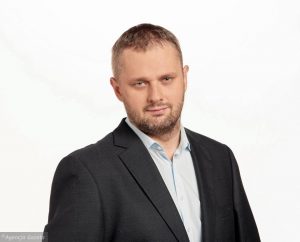
Journalist Bartosz Wieliński was targeted by the head of TVP Info’s news site.
In November, after Bartosz Wieliński, a journalist with the independent daily Gazeta Wyborcza, gave a critical account of a speech made by the Polish ambassador to Berlin at a conference devoted to the centenary of Poland’s independence, the head of the state broadcaster’s news website, TVP Info, accused him of lying and of putting the interests of Germany before those of his own country.
Only a few days before this attack, two media outlets that support Poland’s ruling national-conservative Law and Justice (PiS) party accused the independent US-owned channel TVN of fabricating the evidence on which a report about the resurgence of neo-Nazism in Poland was based.
Since it came to power in 2015, PiS – which has been accused by its critics of tolerating organisations that espouse far-right ideologies – has put pressure on independent media outlets, many of which are foreign-owned, as part of its campaign to “re-polonise” the media, and now appears to be using the public broadcaster and other tame outlets as accessories in this drive.
Willing accomplices
In Hungary, where the government led by Viktor Orbán has succeeded in imposing tight control on all but a few determinedly independent media outlets, a number of loyal publications are available for the purposes of vilification.
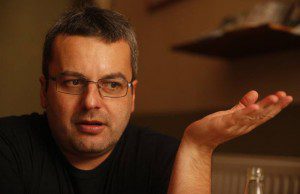
2015 Freedom of Expression Journalism Award winner Tamás Bodoky, founder of Atlatszo.hu
In September, a whole raft of pro-government media outlets vied with each other to depict Tamás Bodoky, the editor-in-chief of the investigative journalism platform Átlátszó and winner of the 2015 Index on Censorship Freedom of Expression Award for Journalism, as a “Soros hireling”. Bodoky became the target of a co-ordinated smear campaign after he posted on Facebook a picture of himself taken in Brussels with Dutch Green MEP Judith Sargentini, whose report on the Fidesz government’s infringement of core EU values had formed the basis for the European parliament’s censure motion against Hungary a few weeks earlier.
Another Hungarian journalist, András Dezső, who works for the independent news website Index.hu, also recently came under attack from pro-government media outlets after a Budapest court let him off with a reprimand over a case in which he was alleged to have made unauthorised use of personal information. In an article published before April’s general election, Dezső had cast doubt on the account of a woman who declared on Hungarian TV that she felt safer in Budapest than in Stockholm because of the lower level of immigration in Hungary. The airing of the interview by the public broadcaster was seen as providing support for Fidesz’s anti-immigration stance and aiding its election victory.
A criminal charge was issued against Dezső for “misuse of personal data”, and after he received what was described in the Hungarian media as “the mildest possible punishment”, two pro-government news websites, 888.hu and Origo.hu, accused him of deliberately propagating fake news and seeking to mislead his readers.
Why do they do it?
What motivates those journalists who smear their colleagues who seek to hold power to account?
There does not appear to be a simple answer to this question. While some may vilify fellow journalists to order purely for financial gain (or because of a desire for job security, government-sponsored media outlets generally being on a more secure financial footing than their independent counterparts), some appear to approach the task with at least a measure of conviction.
Ilcho Cvetanoski, who reports on Bosnia, Croatia, Macedonia and Montenegro for Mapping Media Freedom and has observed many smear campaigns over the years, believes that financial and ideological motivating factors are often inextricably intertwined. He points out that two decades on from the armed conflicts in the region, Balkans societies are still deeply divided along ideological and ethnic lines, and many people still find it extremely difficult to accept the right of others to see things differently. Cvetanoski notes that there are many “true believers” who are genuinely convinced that they have a duty to defend their country from the “other” – a group in which they tend to lump critical journalists along with mercenaries, spies and traitors.
Lazara Marinković, who covers Serbia for Mapping Media Freedom, believes that the main motivation there is a need to be on the winning side and to please those in power. “Often they actually enjoy doing it, either for ideological reasons or because they feel more powerful when they are on the side of the ruling party,” she told Mapping Media Freedom. Marinković noted that the majority of Serbian tabloids and TV stations that conduct smear campaigns against independent journalists are owned by businessmen who have close links to President Aleksandar Vučić’s national conservative Serbian Progressive Party (SNS). Vučić began his political career during the Milosević era, when he served as Minister of Information.
In Poland, the divisions in society and the consequent lack of tolerance in political culture have been blamed for the increasing polarisation of the media. Michal Głowacki, a professor of media studies at Warsaw University, told Mapping Media Freedom that journalists take their cue from politicians in failing to show respect for fellow journalists associated with the “other side”. “They even use the same language as politicians,” Głowacki notes.
This is a view echoed by Hungarian journalist Anita Kőműves, a colleague of Bodoky’s at Átlátszó. Kőműves, however, insists that while journalists who work for independent media outlets strive to uphold the principles of journalistic ethics, the same cannot be said of those employed by pro-government outlets. “Some of those serving the government at propaganda outlets think that the two ‘sides’ of the Hungarian media are equally biased and that they are not acting any differently from their counterparts in the independent media sphere. However, this is not true: pro-government propaganda outlets do not adhere to even the basic rules of journalism,” she told Mapping Media Freedom.[/vc_column_text][vc_raw_html]JTNDaWZyYW1lJTIwd2lkdGglM0QlMjI3MDAlMjIlMjBoZWlnaHQlM0QlMjI0MDAlMjIlMjBzcmMlM0QlMjJodHRwcyUzQSUyRiUyRm1hcHBpbmdtZWRpYWZyZWVkb20udXNoYWhpZGkuaW8lMkZ2aWV3cyUyRm1hcCUyMiUyMGZyYW1lYm9yZGVyJTNEJTIyMCUyMiUyMGFsbG93ZnVsbHNjcmVlbiUzRSUzQyUyRmlmcmFtZSUzRQ==[/vc_raw_html][vc_basic_grid post_type=”post” max_items=”4″ element_width=”6″ grid_id=”vc_gid:1545385969139-cb42990e-b3e2-3″ taxonomies=”9044″][/vc_column][/vc_row]
12 Apr 2018 | Awards, Fellowship 2018, Mapping Media Freedom, News and features
[vc_row][vc_column][vc_video link=”https://youtu.be/hKK5t6te-GE”][vc_column_text]Novosti weekly is a Serbian-language magazine in Croatia. It is run by journalists who are both Serbs and Croats, and are some of the most highly esteemed reporters in the country.
Although the weekly is fully funded as a Serb minority publication by the Serbian National Council, the paper deals with a whole range topics, not only those directly related to the minority status of Croatian Serbs, but also covering all the political, economic, social and cultural issues that are important for the Croatian society as a whole. 
The paper’s journalists have come under intense pressure in the last year from Croatian nationalists with attacks and death threats that have been sanctioned by ultra-conservative forces in the country.
“As journalists we realise that our professional duty is to write truth, but because of the conditions in which we work, a significant part of our business has become the defence of the right to freedom of expression, without which truth is not possible,” said Novosti Weekly.
This is against a backdrop of a nationalist coalition government led by the conservative Croatian Democratic Union (HDZ), which oversaw the sacking or demotion of 70 public broadcast journalists in the months after it came to power in January 2016.
Novosti irritates nationalists by writing about the things Croatian society is often silent on, for instance, the war crimes committed by the Croatian side during the Balkans war in the 1990s and the role of Croatian forces in the war in Bosnia and Herzegovina. It often uses satirical front covers to make its point.
The weekly also stands up for minorities, including LGBT groups, against the conservative forces of the Catholic Church and war veterans. One of their journalistic campaigns has been to challenge attempts by the far right to rehabilitate the Ustaše, the fascists who were in power in Croatia during World War II.
Novosti prides itself also on classic investigative journalism, which uncovers political and corporate corruption; and they do not shy away from exposing the pressure on editors and journalists from both censorship and self-censorship.
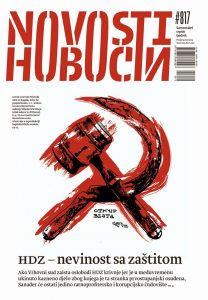
2017 was a year which saw the further rise in Croatia of right-wing extremism and ultra-conservative tendencies. Novosti weekly has been at the forefront of fighting the nationalist purges, becoming a forum for voices of resistance.
At the beginning of December 2016, Novosti broke a story about plans by the government, and veterans associations to install a memorial plaque with the World War II fascist slogan Za dom spremni (Ready for the Homeland) near the site of the former ustaše concentration camp at Jasenovac where more than 83,000 Serbs, Roma and Jews died.
Immediately after the release of the story in Novosti, the far-right political party A-HSP organised a protest under the windows of the magazine’s offices shouting, fascist slogans and anti-Serbian insults.
Some war veterans’ societies filed criminal charges against journalists, and others launched a series of private lawsuits against the publisher of the Novosti.
In August 2017, the extreme right piled on the pressure, accusing Croatian Serbs of setting the fires which burnt down forests in large parts of the Croatian coast during the summer.
They claimed Novosti Weekly had been encouraging the arsonists and Novosti received threats of violence – to shoot journalists and bomb the offices. The editorial team was told they would end up killed like Charlie Hebdo journalists.
The culmination of the summer of threats happened when the A-HSP organised another protest in front of Novosti’s offices and burnt copies of the magazine under the windows of the offices
“We would like to thank you for recognizing our work as well as for putting Novosti Weekly into the international spotlight after reaching the shortlist of the Freedom of Expression Awards,” said Novosti Weekly. “Your recognition means as much as the reactions of all relevant international journalistic organizations that stood in Weekly Novosti’s defense after facing pressure and threats for the work that we do. It’s a strong message of support that speaks volumes not only for all those who burnt out paper, but also to those who tried to ensure our destruction.”
See the full shortlist for Index on Censorship’s Freedom of Expression Awards 2018 here.[/vc_column_text][/vc_column][/vc_row][vc_row full_width=”stretch_row_content” equal_height=”yes” el_class=”text_white” css=”.vc_custom_1490258749071{background-color: #cb3000 !important;}”][vc_column width=”1/2″][vc_custom_heading text=”Support the Index Fellowship.” font_container=”tag:p|font_size:28|text_align:center” use_theme_fonts=”yes” link=”url:https%3A%2F%2Fwww.indexoncensorship.org%2Fsupport-the-freedom-of-expression-awards%2F|||”][vc_column_text]
By donating to the Freedom of Expression Awards you help us support
individuals and groups at the forefront of tackling censorship.
Find out more
[/vc_column_text][/vc_column][vc_column width=”1/2″ css=”.vc_custom_1521479845471{background-image: url(https://www.indexoncensorship.org/wp-content/uploads/2017/05/2017-awards-fellows-1460×490-2_revised.jpg?id=90090) !important;background-position: center !important;background-repeat: no-repeat !important;background-size: cover !important;}”][/vc_column][/vc_row][vc_row][vc_column][vc_basic_grid post_type=”post” max_items=”4″ element_width=”6″ grid_id=”vc_gid:1523523750750-06e6cb2f-6ea9-6″ taxonomies=”10735″][/vc_column][/vc_row]
15 Mar 2017 | Campaigns, Campaigns -- Featured, Statements, Turkey, Turkey Statements
JOINT ORAL STATEMENT ON THE DETERIORATION OF FREEDOM OF EXPRESSION AND MEDIA FREEDOM IN TURKEY
UN Human Rights Council 34th Special Session
Item 4: Human rights situations that require the Council’s attention
15 March 2017
Mr President,
Index on Censorship, PEN International, ARTICLE 19 and 65 organisations are deeply concerned by the continuous deterioration of freedom of expression and media freedom in Turkey following the violent and contemptible coup attempt on 15 July 2016.
Over 180 news outlets have been shut down under laws passed by presidential decree following the imposition of a state of emergency. There are now at least 148 writers, journalists and media workers in prison, including Ahmet Şık, Kadri Gürsel, Ahmet and Mehmet Altan, Ayşe Nazlı Ilıcak and İnan Kızılkaya, making Turkey the biggest jailer of journalists in the world. The Turkish authorities are abusing the state of emergency by severely restricting fundamental rights and freedoms, stifling criticism and limiting the diversity of views and opinions available in the public sphere.
Restrictions have reached new heights in the lead up to a crucial referendum on constitutional reforms, which would significantly increase executive powers, set for 16 April 2017. The Turkish authorities’ campaign has been marred by threats, arrests and prosecutions of those who have voiced criticism of the proposed amendments. Several members of the opposition have been arrested on terror charges. Thousands of public employees, including hundreds of academics and opponents to the constitutional reforms, were dismissed in February. Outspoken “No” campaigners have been detained, adding to the overall climate of suspicion and fear. The rights to freedom of expression and information, essential to fair and free elections, are in jeopardy.
In the run-up to the referendum, the need for media pluralism is more important than ever. Voters have the right to be duly informed and to be provided with comprehensive information on all views, including dissenting voices, in sufficient time. The prevailing atmosphere should be one of respect for human rights and fundamental freedoms. There should be no fear of reprisals.
We urge this Council, its members and observer states, to call on the Turkish authorities to:
- Guarantee equal broadcasting time for all parties and allow for the dissemination of all information to the maximum extent possible in order to ensure that voters are fully informed;
- Put an end to the climate of suspicion and fear by:
- Immediately releasing all those held in prison for exercising their rights to freedom of opinion and expression;
- Ending the prosecutions and detention of journalists simply on the basis of the content of their journalism or alleged affiliations;
- Halting executive interference with independent news organisations including in relation to editorial decisions, dismissals of journalists and editors, pressure and intimidation against critical news outlets and journalists;
- Revoke the excessively broad provisions under the state of emergency, the application of which, in practice, are incompatible with Turkey’s human rights obligations.
Thank you Mr. President
ActiveWatch – Media Monitoring Agency
Adil Soz – International Foundation for Protection of Freedom of Speech
Albanian Media Institute
Americans for Democracy & Human Rights in Bahrain
ARTICLE 19
Association of European Journalists
Basque PEN
Brazilian Association for Investigative Journalism
Canadian Journalists for Free Expression
Cartoonists Rights Network International
Center for Independent Journalism – Hungary
Croatian PEN centre
Danish PEN
Digital Rights Foundation
English PEN
European Centre for Press and Media Freedom
European Federation of Journalists
Finnish PEN
Foro de Periodismo Argentino
German PEN
Global Editors Network
Gulf Centre for Human Rights
Human rights watch
Icelandic PEN
Independent Chinese PEN Center
Independent Journalism Center – Moldova
Index on Censorship
Institute for Media and Society
International Press Institute
International Publishers Association
Journaliste en danger
Media Foundation for West Africa
Media Institute of Southern Africa
Media Watch
MYMEDIA
Nigeria PEN Centre
Norwegian PEN
Pacific Islands News Association
Pakistan Press Foundation
Palestine PEN
PEN American Center
PEN Austria
PEN Canada
PEN Català
PEN Centre in Bosnia and Herzegovina
PEN Centre of German-Speaking Writers Abroad
PEN Eritrea in exile
PEN Esperanto
PEN Estonia
PEN France
PEN International
PEN Melbourne
PEN Myanmar
PEN Romania
PEN Suisse Romand
PEN Trieste
Portuguese PEN Centre
Punto24
Reporters Without Borders
Russian PEN Centre
San Miguel PEN
Serbian PEN Centre
Social Media Exchange – SMEX
South East Europe Media Organisation (SEEMO)
South East European Network for Professionalization of Media
Vigilance pour la Démocratie et l’État Civique
Wales PEN Cymru
World Association of Newspapers and News Publishers (WANIFRA)
22 Aug 2016 | Bosnia, mobile, News and features
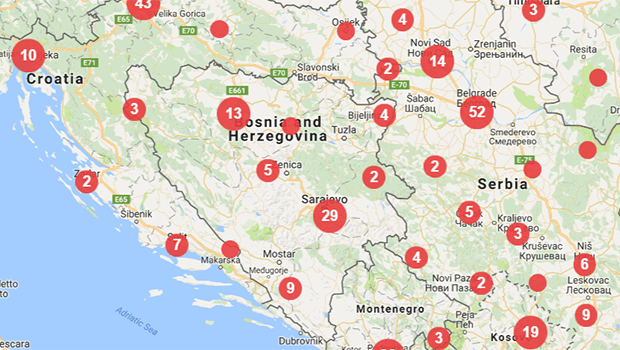
University professors, poets and artists signed an open letter in support of three media workers who were targeted with death threats and hate speech. The letter, which was published in the Sarajevo daily Oslobodjenje on 21 July, said that the journalists are “targeted just because they expressed their view which is different from the majority’s”.
“Regardless of whether one agrees or not with the above-mentioned views, instigation of death threats and public lynching through creating a modern day Bosnian Index Librorum Prohibitorum is unacceptable,” the letter said.
The cases were reported to Mapping Media Freedom over three days in July.
In the first incident, Vuk Bacanovic, a journalist for the Radio-Television of the Federation of Bosnia and Herzegovina, was fired for allegedly violating the internal rules and the ethical code of the television network. In a Facebook post on his personal page he criticised a public art installation that depicted the federal entity of Republika Srpska as a mass grave and concentration camp. Bacanovic wrote that he “hates the assholes from Sarajevo” who were “talking crap” by saying the city has a multi-ethnic spirit. After articles about the post were published, Bacanovic received numerous death threats via Facebook, regional TV outlet N1 reported.
Nenad Velickovic, editor-in-chief of educational career-oriented magazine Skolegijum, was then verbally harassed and threatened as a result of three articles written by Filip Mursel Begovic, editor-in-chief of the weekly Stav, which were published in June and July. Begovic described Velickovic as a “man with a hidden and dangerous agenda”, “a falsifier” and a “Serbian nationalist” while describing the magazine Skolegijum as “extended arm of Serbian chauvinism”, Analiziraj.ba reported.
The letter was also written in support of the secretary general of BH Journalists’ Association Borka Rudic, who was subjected to verbal harassment by unidentified men after a high-ranking member of the Party of Democratic Action, an ethnic Bosniak political party, described her, amongst other things, as a “lobbyist for Fethullah Gulen”, website media.ba, reports.
The three incidents reflect the ethnic divisions and stereotypes that were re-enforced by the 1992-1995 war in Bosnia. The post-conflict society is governed through a complex political system established by the 1995 Dayton Peace Accords. The power-sharing constitution recognises each of the three major ethnic groups – Bosniaks (Muslims), Serbs (Orthodox) and Croats (Catholics) – as the constituent peoples of Bosnia. In practice, the recognition means that anyone not identified as belonging to one of the three groups could not be elected to hold a public office, despite a 2009 European Court of Human Rights ruling ordering the constitution to be revised.
Following the formula set out in the Dayton Accords, Bosnia and Herzegovina is divided into two entities – the Federation of Bosnia and Herzegovina, with majority ethnic Bosniak and ethnic Croatian inhabitants, and the Republika Srpska, with majority ethnic Serbian population. Additionally there is the district of Brcko, which is separate enclave jointly administered by both.
The three groups also differ on the future of Bosnia. Some Bosniaks advocate for a more unitary state, while some Serbs want a more confederate arrangement or even dissolution of the state. At the same time there are Croats that want a separate ethnic entity. The competing visions of Bosnia’s future are heavily influenced by historic and recent incidents including charges of genocide, crimes against humanity and other atrocities that occurred during the 1992-95.
The Centre for Security Governance says that the governing structure “has discouraged inter-group cooperation and reconciliation. Political elites have pandered to ethnic fears, resulting in the electoral victories of ethnonational parties via the phenomenon of ‘ethnic outbidding’.”
Some politicians use friendly media to advocate for further strengthening of ethnic politics, while journalists and intellectuals that argue for strengthening civic identities and bridging ethnic hatred are usually vilified as traitors if they are from the same ethnic background, or enemies, if they are from another ethnicity. All of the cases addressed in the open letter originated in Bosniak nationalist media and were targeted at either another ethnicity or individuals who prefer civic above ethnic identity. Velickovic was described as a “man with a hidden and dangerous agenda” by a Bosniak journalist because he was advocating for non-nationalistic school curriculum.
“The importance of maintaining strong journalistic ethics cannot be underscored enough, especially given the country’s recent history. Members of the media profession must strive to be balanced, refrain from inflaming already tense inter-ethnic relations and guard against being used for political ends,” Hannah Machlin, project officer for Index on Censorship’s Mapping Media Freedom, said.
Dunja Mijatovic, OSCE Representative on Freedom of the Media, in an open letter also noted that the latest events open a very worrying chapter on the safety of journalists.
“People engaged in investigative reporting and expressing different opinions, even provocative ones, should play a legitimate part in a healthy debate and their voices should not be restricted,” Mijatovic said.
In the current climate, the open letter in support of and signed by people of different ethnicities is a small step forward. Signatory Asim Mujkic, a professor at the faculty of political sciences at the University of Sarajevo, said the cases were a call to action.
“My initial motive was to protest against the mainstream hegemonic ideological view that aggressively imposes itself upon independent and free-thinking intellectuals and public workers that, in the context of Bosnia and Herzegovina, usually targets vulnerable ethnicities for the purpose of its political mobilization,” Mujkic told Index on Censorship.“We need to fire back, especially in such circumstances.”






